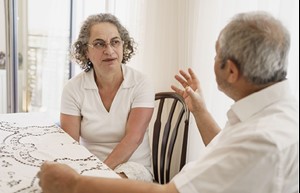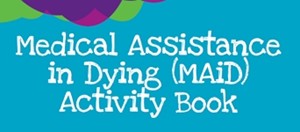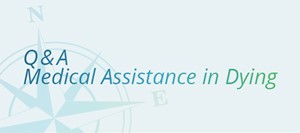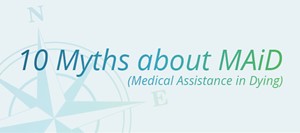The application process for MAiD
"It's hard to say goodbye to all the people I care about, but it's harder for me now to continue living .... that's why I want MAiD. "
If a person is considering MAiD, the first step is to speak to their healthcare provider or their local MAiD office.
The MAiD office will explain and assist with the application process.
The person must complete a MAiD request form. If the person is unable to write, another adult can sign the request form under the person’s direction. This adult must be at least 18 years of age, understand what it means to have MAiD, and not knowingly benefit from the person’s death.
The request form must be signed and dated in front of a witness. * The witness also signs and dates the form.
Two assessments are completed by two different MAiD practitioners.
Although it is not required, it can be very helpful, with the person’s consent, to have family present at the assessments. Other MAiD team members such as a nurse or social worker may also be present. At some point during the assessments, the MAiD practitioner will also meet with the person alone to help ensure their request is voluntary.
Resources
The witness:
- Must be at least 18 years of age and understand what it means to request MAiD.
- Cannot knowingly benefit from the person’s death.
- Cannot be an owner or operator of a health care facility where the individual lives or is receiving care.
- Cannot be an unpaid caregiver.
- Can be a paid health or personal care worker
The person requesting MAiD must be able to give permission or agree to an assisted death after receiving all the information needed to make this decision. This is known as informed consent. The individual must have the ability to understand:
- Their medical diagnosis.
- All treatment options.
- Options to relieve suffering, including palliative care.
- The information they have been given about having MAiD.
- That medical assistance in dying will cause their death.
The ability to understand and appreciate the information needed to make a decision is known as capacity. In medicine, capacity is ‘task-specific’, meaning a person can have the capacity to make a request for MAiD while they may not have the capacity to balance their cheque book.
No. The MAiD practitioners must take reasonable steps to assist the person to communicate such as pointing, blinking, or tapping.
If the person is unable to write, another adult can sign the written request and consent form under the person’s direction. This adult must be at least 18 years of age, understand what it means to have MAiD, and not knowingly benefit from the person’s death.
Just before MAiD is provided, the person must be given the opportunity to withdraw their request and they must give consent to have MAiD. An exception to this requirement is possible through a Waiver of Final Consent.
Waiver of Final Consent
The requirement for giving final consent just before MAiD is provided may be waived, only if:
- The person’s natural death is reasonably foreseeable.
AND
While the person was able to make healthcare decisions the following occurred:
- The person requested, was assessed, approved to receive MAID, and has chosen the date to have MAiD.
- One or both of the MAiD practitioners indicated that the person is at risk of losing capacity to provide final consent.
- The person completed a Waiver of Final Consent form with their MAiD practitioner. This form gives consent in advance to have MAiD on or before a chosen date if capacity is lost.
Just before MAiD is provided, the person must be given the opportunity to withdraw their request and they must give consent to have MAiD. A Waiver of Final Consent is not allowed if death is not reasonably foreseeable.
- One of the two MAiD assessors must have expertise in the condition that is causing the person to suffer, or they must consult with a practitioner who has that expertise.
- The eligibility assessments must take a minimum of 90 days. *
- The person must be informed of the available ways to relieve their suffering, including counselling services, mental health and disability support services, community services, and palliative care, and they must be offered consultations with relevant professionals and
- The MAiD practitioners must agree that the person has given serious consideration to all the available options that may relieve their suffering.
*In some situations, if both assessors agree that the person is at risk of losing capacity, the person may be able to have an assisted death in less than 90 days. They must still be able to give consent just before receiving MAiD if their natural death is not reasonably foreseeable.
The federal government has outlined the above processes for requesting MAiD. Provinces and territories will also have their own specific practices.
No, family does not need to agree with the person’s decision, nor be involved. It is up to the person whether to consult or inform family or friends. This is the same as other healthcare decisions.
MAiD practitioners may explore the reasons a person is choosing not to tell family or friends. They may be able to help talk through issues or refer to counselling or other resources.
Once approved, there is no obligation to have an assisted death. If the person would like to have MAiD, they would set a date and time with the MAiD provider. They can change their mind at any time, up to and including the day and time when MAiD is planned.
With some exceptions, a person can have MAiD at home or in a health facility. As much as possible, MAiD providers try to accommodate the person’s wish for where MAiD takes place.
Read more
Yes, palliative care continues until the assisted death and provides grief support to family.
More Articles

What is MAiD?

Why do people consider MAiD?

Telling family and friends

Talking to children and youth about MAiD

Starting a conversation about MAiD with the person who is ill

Seeking information and starting the process

Capacity and consent and why they are important

Having the assessments

Choosing when and where

Planning for the time left

Planning the day of MAiD

A medically assisted death

Grief after a medically assisted death

For healthcare providers







